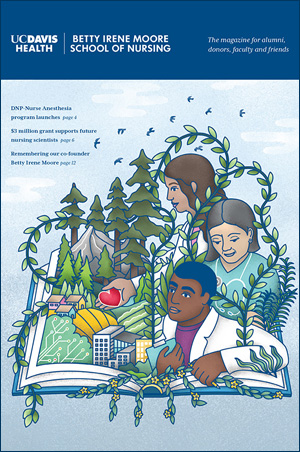Inclusive Drivers of Excellence
The Betty Irene Moore School of Nursing at UC Davis was founded to advance health and ignite leadership through innovative education, transformative research and bold system change. The University of California, Davis is a public, land-grant university, and as such, we are committed to partnerships with communities, to educational practices and research that move us toward the delivery of high quality health care and optimal health status for all.
We recognize the strength, vitality and innovative problem-solving that comes from partnerships with our local, statewide, national and global communities. It is through these partnerships that we can address complex health care issues including disparate health outcomes between groups and communities of people.
Our versatile research and collaborative classrooms must represent the UC Davis Mission and the communities we serve. We aim to prepare graduates who can inform and participate in improving the health policies needed for optimal health and health access for all.
We strive to ensure that opportunities for expression, participation, mentoring and promotion are extended fairly to each member of our school community— including students, staff, administrators and faculty — as well as to honor individuals’ potential and contributions. We stand firmly against all forms of discrimination and remain dedicated to upholding the rights and dignity of every individual, regardless of race, ethnicity, gender identity, sexual orientation, disability, socioeconomic status, religion or other identities. We have developed schoolwide Team Agreements to steer us toward this goal.
We have a sustainable model in which we take compassion and humility as our guiding compass. As we learn and work together through the ebb and flow of our development as an organization and as individuals, we commit to living and upholding the principles of a cultural humility framework that encompass these three features:
- Committing to ongoing learning, self-evaluation and self-critique
- Lessening power imbalances, inherent in the clinician-patient, teacher-student, community-academic dynamics, as well as in the professional hierarchies that exist within the academic health center
- Honoring the expertise that exists in others, including the surrounding community, to establish mutually non-paternalistic partnerships
The goal of this cultural humility approach is to continually nurture a genuine feeling of community and belonging across all individuals within our school, embodying a humble perspective. This approach leverages the expression and integration of each person’s talents, perspectives and unique lived experiences to create an innovative, nimble academic group that extends the highest, most impactful service to the larger university, regional community and beyond. The UC Davis Principles of Community guide our behavior and self-reflection.





